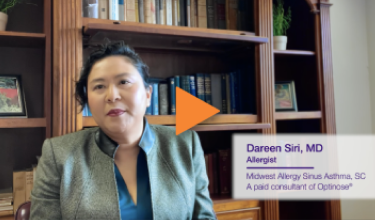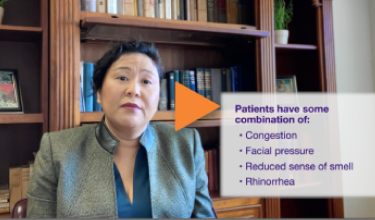Peer Insights
Get clinical insight from allergists and ear, nose, and throat specialists (ENT) about their experiences with XHANCE. Dr. Ow, Dr. Murphy, Dr. Reh, Dr. Bedrosian, Dr. Siri, and Dr. Hill are paid consultants for Optinose.




In clinical trials, XHANCE significantly improved nasal congestion at Week 4 and significantly reduced bilateral polyp grade at Week 16 (coprimary endpoints)1:
- Average reduction in congestion using a 0-3 point scale: 0.62 XHANCE 372 mcg BID vs 0.24 EDS-placebo (P<0.001)
- Average reduction of polyp grade in a clinical trial using a 0-3 point scale: 1.41 XHANCE 372 mcg BID vs 0.61 EDS-placebo (P<0.001)
- Full Prescribing Information for XHANCE (fluticasone propionate). OptiNose US, Inc.; 2023.
- Data on file. OptiNose US, Inc.
CONTRAINDICATIONS:
Hypersensitivity to any ingredient in XHANCE.
WARNINGS AND PRECAUTIONS:
- Local nasal adverse reactions, including epistaxis, erosion, ulceration, septal perforation, Candida albicans infection, and impaired wound healing, can occur. Monitor patients periodically for signs of possible changes on the nasal mucosa. Avoid use in patients with recent nasal ulcerations, nasal surgery, or nasal trauma until healing has occurred.
- Glaucoma and cataracts may occur with long-term use. Consider referral to an ophthalmologist in patients who develop ocular symptoms or use XHANCE long-term.
- Hypersensitivity reactions (e.g., anaphylaxis, angioedema, urticaria, contact dermatitis, rash, hypotension, and bronchospasm) have been reported after administration of fluticasone propionate. Discontinue XHANCE if such reactions occur.
- Immunosuppression and infections can occur, including potential increased susceptibility to or worsening of infections (e.g., existing tuberculosis; fungal, bacterial, viral, or parasitic infection; ocular herpes simplex). Use with caution in patients with these infections. More serious or even fatal course of chickenpox or measles can occur in susceptible patients.
- Hypercorticism and adrenal suppression may occur with very high dosages or at the regular dosage in susceptible individuals. If such changes occur, discontinue XHANCE slowly.
- Assess for decrease in bone mineral density initially and periodically thereafter.
ADVERSE REACTIONS:
- Chronic rhinosinusitis without nasal polyps: The most common adverse reactions (incidence ≥ 3%) are epistaxis, headache, and nasopharyngitis.
- Chronic rhinosinusitis with nasal polyps: The most common adverse reactions (incidence ≥ 3%) are epistaxis, nasal septal ulceration, nasopharyngitis, nasal mucosal erythema, nasal mucosal ulcerations, nasal congestion, acute sinusitis, nasal septal erythema, headache, and pharyngitis.
DRUG INTERACTIONS:
Strong cytochrome P450 3A4 inhibitors (e.g., ritonavir, ketoconazole): Use not recommended. May increase risk of systemic corticosteroid effects.
USE IN SPECIFIC POPULATIONS:
Hepatic impairment. Monitor patients for signs of increased drug exposure.
Please see Full Prescribing Information pdf opensfull Prescribing Information, including Instructions for Use.
- Full Prescribing Information for XHANCE (fluticasone propionate). OptiNose US, Inc.; 2023.
- Data on file. OptiNose US, Inc.